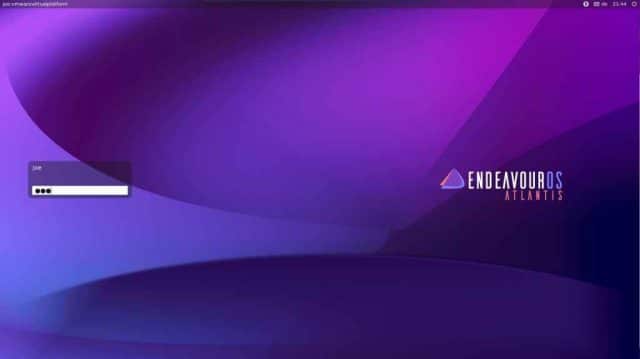Arch-based EndeavourOS 21.4 'Atlantis' operating system is here with Linux 5.15

Happy Friday, fellow Lixux distro-hoppers! The weekend is almost here, and once again, we have a new version of a Linux-based operating system to play with. This time, it is an exciting rolling-release distro called "EndeavourOS."
Today, version 21.4 of that operating system becomes available for download. Code-named "Atlantis," this Arch-based distribution has many new features and updates, most notably of which is the use of the bleeding-edge Linux kernel 5.15.
ALSO READ: OWC launches Mercury Elite Pro mini USB-C storage drive for Mac, Windows, and Linux
Bryan Poerwo, the distro's founder and project leader explains, "To all the aspiring EndeavourOS astronauts and sailors who want to try Atlantis, I have two important things to say. First one, even though we carefully tested this release, keep in mind that we don’t have access to every single working hardware in the world, this project is a labour of love after all. If you stumble across an issue, just notify us and together we can improve the install experience. And last but not least, you’re not alone during your journey, our fantastic community is there to help you ship-shaping your Endeavour, just have fun with it."
ALSO READ: Turtle Beach announces Bumblebee II USB-C mic from Neat Microphones

Poerwo shares an extensive changelog below.
EOS apps improvements and additions
- NVIDIA users have a new sanity check for NVIDIA and kernel updates. The check helps preventing boot problems after update. Apps
UpdateInTerminal,eos-update-notifierandwelcomeinclude this update check. - Welcome has a new button DE: information (DE is the installed desktop name) and opens the browser to the dedicated DE info page.
- Our
eos-apps-infois added by default. - The
eos-apps-info-helperis now capable of showing information about many more apps, and it supports using a web browser which can be configured by yourself. - An addition to
paccache-service-managerhas been made, which now ships with a checkbox for deleting the cache of uninstalled packages. - A new and improved schedule configuration window for
eos-update-notifier. - The function
grub-toolsnow adds info and warnings when needed about variableGRUB_DISABLE_OS_PROBERin/etc/default/grub. - An improvement on
AKMthat marks the current running kernel with the * symbol.
Calamares
- The option to send logs when an installation failed is now working again.
- Calamares can read the output from pacman actions now and will show the install of the packages under the progress bar. With this addition we no longer need the second debug terminal to show log outputs from pacman for pacstrap and cleaner scripts.
- We now make use of randomized EFI path naming, to avoid overwriting the efi entry when installing a second EndeavourOS system alongside using the same ESP.
- Installing XFCE and i3 at the same time is possible again – using the old method to install i3 setup/theme (fetching it from GitHub/GitLab) for now, instead of the skel package for i3 to be able to have i3 themed as used in XFCE.
- fstrim.timer is now enabled by default.
- Nvidia proprietary driver – DRM modesetting is enabled by default, to solve the issue of booting into a black screen for Optimus systems.
- Nvidia driver still gets installed by default if user boots from Nvidia Boot Option, now
nvidia-drm.modeset=1will be added to the grub kernel line to prevent booting the system with Nouveau. - BTRFS now uses zstd for installation on both SSD and HDD.
- A package list clean up on i3-wm and all the DE selections to install only the most necessary settings.
- The EndeavourOS repo packages and the welcome app now connects to GitLab by default, to avoid issues for users in countries that have blocked GitHub. Although the option to connect to GitHub is still there for those who wishes to.
- For the same reason we have removed GitHub from our mirrorlist.
- The method to install one of the community editions has been changed. Now you choose the community edition first, which is a fixed settings package that can’t be altered to avoid failed installs, then you get to the base package module where you can deselect certain packages if you wish to. If not, you can leave it as it is, which is highly recommended for new and inexperienced users.
ISO and running systems
- OS prober is installed by default again for a better experience managing multi-booting several systems.
- Improvement for legacy boot, the label now fits the requirements for FAT formatting.
- We now offer the possibility to write your own bash commands to file
user_commands.bash. This feature is an advanced extension to the existing feature in fileuser_pkglist.txt. - Legacy/Bios boot now has a fixed label name to make it compatible for older Bios systems.
- The r8168 driver is not installed on the ISO anymore, the r8169 module from the kernel is used by default when the ISO boots. However, auto detection makes it possible to install and switch to the r8168 module if needed with a a popup message that appears in those cases. When chosen, the system will install the driver locally from the ISO (no internet connection needed) and enable the r8168 module, which also will be used on the installed system.
- VMD fixes have been made to prevent the issue of Intel RST technology drives not being recognised by the system.
- To get certain PCIe-based M.2 drives recognised by the system, nvme_load=YES added to GRUB_CMDLINE_LINUX_DEFAULT in /etc/default/grub by default.
- SWAY WM is now using ly DM as a workaround due to lightdm issues in combination with the WM.
- Pipewire is now enabled by default.
- Some new community wallpapers have been added, including the images used in this announcement.
- A hotfix feature is added to the ISO, so the developers can immediately push an immediate bugfix to the ISO without creating a new one. The hotfix feature will start automatically in the Welcome app, checking and downloading fixes before Calamares has started. This feature is available from this release and onwards, so the previous releases don’t have this feature baked-in. This does not mean the ISO is on a rolling release also, the offline installer periodically still needs a new ISO release. The hotfix feature only gives us the opportunity to anticipate faster when a bug does appear, it also helps to reduce the workload for the dev team.
Ready to try EndeavourOS 21.4 for yourself? You can grab an Atlantis ISO here now. If you do install the Linux-based operating system, we kindly ask that you share your experience with us in the comments below. Please do let us know if you think this distribution is worth checking out.
Image credit: NagornyiSergiy / Shutterstock
